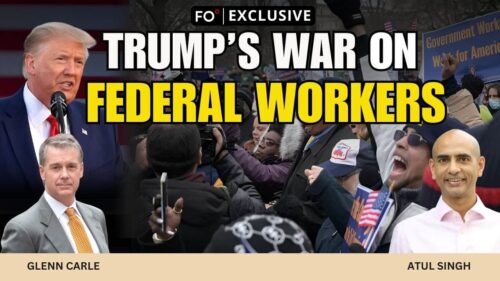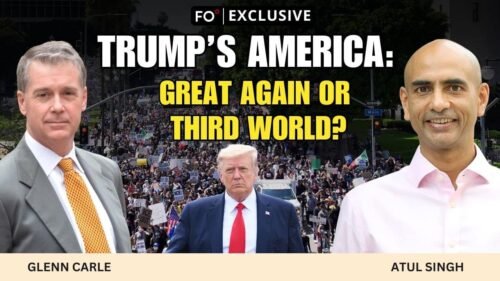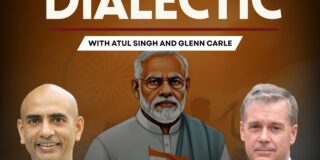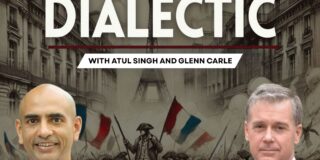Fair Observer Founder, CEO & Editor-in-Chief Atul Singh speaks with Ankit Jain, a voting rights attorney and the shadow senator of Washington, DC. Together, they discuss the city’s unusual political status, US President Donald Trump’s interventions in the capital and broader questions about crime, governance, statehood and the future of American democracy.
What is a shadow senator?
Jain begins by clarifying his unusual role as one of DC’s two elected shadow senators. Unlike other states, Washington, DC, has no voting representation in Congress. To push for statehood and defend its autonomy, the city created two non-voting senators and one non-voting representative. Jain, elected in November 2024 and sworn in this January, explains that his position is part-advocate, part-lobbyist and part-symbolic lawmaker. His chief responsibility is to fight for DC to become the 51st state and secure full representation for its 700,000 residents.
Turmoil in Washington, DC?
Singh turns the conversation to Trump’s controversial policy decisions in the capital. Jain describes how Trump took control of the Metropolitan Police Department for 30 days, placing it under a presidentially appointed official. Trump also sent in hundreds of federal agents and more than 2,000 National Guard troops. The stated aim was to reduce crime, but Jain argues the real goal was to reshape policing “in his own image,” encouraging brutality and overriding DC laws on cooperation with Immigration and Customs Enforcement. He points to raids that terrified the Latino community and recalls seeing federal troops idling around tourist sites like the National Mall rather than addressing real problems.
DC’s governance structure
Jain then explains how fragile DC’s self-government really is. While the city elects a mayor and council, the federal government controls the judiciary and prosecution of adult crimes. Judges are nominated by the President and confirmed by the Senate, and the US Attorney — also a presidential appointee — handles prosecutions. Right now, one in five local court seats sits vacant, slowing trials and fueling more crime. The US Attorney’s office, meanwhile, suffers from mass firings that gutted its capacity. Even when DC passes its own laws, Congress can block or repeal them within 30 to 60 days. To Jain, this makes self-rule an illusion, unlike London or other world capitals, where residents govern their own affairs.
Crime in DC
Trump has repeatedly claimed that crime in Washington is spiraling. Jain challenges this, citing objective data: Crime is down 25% year-on-year, violent crime is at a 30-year low and overall rates remain below pre-COVID-19 levels. He accuses Trump of spreading lies to justify costly deployments that burn “millions of [taxpayer] dollars a day” without solving problems.
Jain acknowledges DC still faces crime and homelessness, but argues solutions require smarter police deployment, housing reform and more funding for mental health. It does not need troop surges and headline-grabbing raids. He also notes that federal restrictions like the Height Act prevent the city from building enough affordable housing, driving rents higher and fueling homelessness.
Trump’s attacks on DC
Jain sees Trump’s interventions as part of a larger pattern. By stripping money from DC’s budget, firing federal workers and blocking judicial nominations, Trump is deliberately weakening the city. These moves deepen DC’s “mini-recession” and leave essential services, from schools to emergency response, undermanned. In Jain’s view, Trump’s goal is not to fix urban challenges but to create crises, then claim sweeping authority to impose his preferred policies.
Should Washington, DC, be a state?
For Jain, it is clear that Washington, DC, should be a state. He argues that nearly every problem facing the capital — crime policy, housing shortages, budget manipulation — stems from the fact that DC is not a state. Its residents pay taxes, serve in the military and number more than Wyoming or Vermont, yet they lack voting representation. Jain calls it a modern case of “taxation without representation,” pointing out that no other democratic nation in the world denies its capital city’s residents the vote. Statehood, he insists, is the only path to justice.
The National Guard in other cities?
Singh raises Trump’s threats to send the National Guard into Los Angeles, California, and Chicago, Illinois. Jain warns this is no idle talk — DC is simply the test case. Because it is not a state, it was an easy target. If successful, Trump could expand the model to cities like Chicago, Detroit, Michigan, or Philadelphia, Pennsylvania, coercing them into repealing policies or cutting federal funds. Jain calls this a “dangerous precedent” and urges Senate Democrats to resist using every tool available, including the filibuster, to stop such power grabs.
Democrats need an upgrade
Finally, Singh raises a broader critique: Democrats have failed urban America. Jain concedes there is truth in this. Democrats, he says, often rely too much on the “old guard” and resist fresh ideas. Still, he pushes back against Republican attacks, noting that Grand Old Party-led cities often have higher crime rates, largely because of permissive gun laws. He argues that Democrats need to show a new vision while Republicans must stop blocking gun control measures and sabotaging agencies like the Bureau of Alcohol, Tobacco, Firearms and Explosives.
To Jain, Trump’s actions in DC reveal a deeper threat: an authoritarian drift that undermines American democracy itself. If left unchecked, he warns, it could spread from Washington to the rest of the nation.
[Lee Thompson-Kolar edited this piece.]
The views expressed in this article/podcast are the author’s own and do not necessarily reflect Fair Observer’s editorial policy.

















Comment